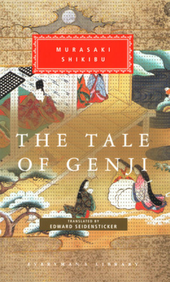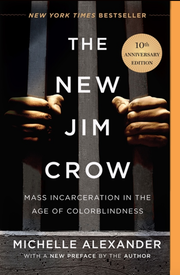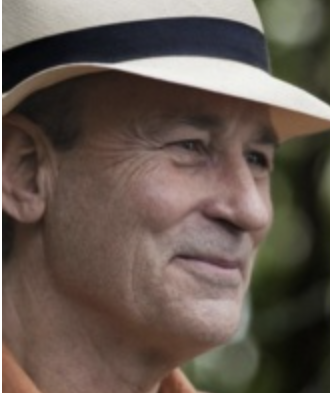My book World Shikibu, Murasaki. The Tale of the Genji. Translated by Edward Seidensticker. New York: Knopf, 1992. I read this tome of 1,184 pages aloud to my partner for numerous evenings over three months. I believe there were several advantages to digesting the work in this manner. One, even though it is a translation, one does sense the delicacy of the Japanese royal court depicted in the early 11th century, the apparent highly educated level of its men and women. I selected this book because author Jane Smiley includes it as number one in her list of 100 books found in Thirteen Ways of Looking at the Novel, and I was curious. Reading aloud also prevents the reader from falling asleep from the apparently repetitive or rhythmic nature (heavily tied to the seasons) of the narrative. Many rituals also are linked to certain days of certain months. Finally, I believe, there is a narrative tone that I, as the reader, am finally able to master to some degree, reading exposition one way, dialogue (according to each character) in another, the poetic passages in yet another. At least I believe so. Most scholars, including Smiley, consider this book the first novel. In large part that may be true. The complex narrative does sustain itself over a long period, more than fifty years, exploring the lives of two primary characters (Genji and his son) and their cohorts. However, there exist some differences. Many times Genji feels like a long narrative that drifts from story to story, as one wanders from room to room of the sprawling architecture of the court’s many palaces. Genji may be the first novel but only in the same way that a Model-T Ford is one of the earliest mass-produced cars. It’s a bit primitive, a suggestion of what is to come. Shikibu does make great use of figurative language, particularly as it relates to nature, as well as the supernatural. She employs trees, flowers, bramble, snow, rain, wind to make comparisons. At the same time, she speaks, on behalf of characters who must believe in this heavily Buddhist period, of former lives now paying for past sins. They follow the Blessed One, are bothered by evil or devilish spirits who, among other things, cause characters to become ill or die. Spirits seem to be a continuation of life on Earth. They can’t accept the peace of death. Furthermore, Shikibu uses foreshadowing to great effect. The savvy reader catches these and appreciates her arrow-pointing. At the same time, Shikibu has some practices that seem underdeveloped. Often, in dialogue, she does not remind the reader who is speaking. And though the omniscient narrator has for a long time been a literary convention, Shikibu herself shifts to the first person numerous times through sly, wink-and-a-nod sort of asides—most often to excuse herself for not adding more detail to a certain scene: “There were many others [poems], but I neglected to set them down” (727). These instances seem clumsy compared to how that POV has been handled since the nineteenth century. She also demonstrates an odd sense of narrative pace, often extending a single scene over pages but passing over a longer era by way of a single sentence. A stylistic quirk, or lack of development? Though Genji is presented as one tome, it is in reality two separate books. The eponymous character, Genji, dies at the end of chapter forty-one. The second part of the narrative is about his heirs. It seems that the first part is more complex, more alive, whereas the complexity of the second part diminishes to no more than a romance novel. But even this characteristic may be the result of serious intent on the part of Shikibu. Perhaps she wishes to portray a certain vapidity among the royals, whose voluptuous but empty lives are repeated again and again throughout the centuries by way of their own progeny. She may also be portraying a social transition. This work is more or less the view of the court, for even the royal servants have status that ordinary Japanese outside of its realm do not have. There is no mention of Samurai warriors or a military or any kind. No battles. No skirmishes that are found in the writing of male novelists, giving the book a uniquely feminine flair. One final thought: Shikibu does not seem to capture at a sophisticated level the characters’ emotions. The only exception may be the emotion of sadness, during which times she refers to their copious tears or their weeping or crying. There seems to be little joy or the portrayal of even ordinary emotions. Perhaps she is only portraying the culture as it appears to her, one where most royals hide their emotions from each other. It seems that this book is much more complex and sophisticated than anything that was happening in Europe at the same time (one may disagree). The use of indirection alone is something that Jane Austen or Alcott would employ much later in time. During any other era I might not have taken the time to read this book, but given the need to do something constructive during the evenings of Covid, I think it a great gift to have done so now. FRIDAY, 12/4/20: My Book World | Oscar Lewis's Five Families
TOMORROW: My Book World | Shikibu's The Tale of Genji
FRIDAY: My Book World | Shikibu's The Tale of Genji
FRIDAY: My Book World | Shikibu's The Tale of Genji
my book world Greenwell, Garth. What Belongs to You. New York: Farrar, 2016. I read Greenwell’s more recent novel, Cleanness, first, a few months earlier. It almost seems that that novel about a young American teacher of high school literature in Sofia, Bulgaria, could be a sequel to this one, Greenwell’s first. If “R” is the same “R” in both novels, then the narrator meets “R” in this the first novel, but he is not in the picture much. No, this is indeed a different novel. In Part I, “Mitko,” the narrator meets the eponymous hustler, in a public rest room and gets entangled in his life of drugs, though not as a user himself. The narrator is charmed by the sparely built, handsome young man, so much so that he gives him money for various enterprises until he realizes he is only enabling Mitko. Mitko is sent on his way though he will make more appearances. In Part II, “Grave,” the narrator is informed of his father’s death and returns to the States. In a long passage, that is both expansive and yet compressed, readers learn how the almost idyllic relationship he has with his father as a boy comes to an end when he confesses to his father that he is gay. Almost every gay man in the world can identify with the sense of rejection and betrayal the narrator feels. In “Pox,” Part III, Mitko returns to inform the narrator that he has not only contracted syphilis but that the narrator and his lover, “R,” both need to get tested. The disease seems to be an apt metaphor for the poison that the three of them share at this point. Mitko is surprised when the narrator indicates it’s all right. It’s a disease; it’s treatable. “R” is much the same way when he is informed. No harm, no foul. Yet, like a bad penny, Mitko continues to return, wanting to start something up with the narrator again, but he realizes he cannot. One last time he sends Mitko on his way with enough money to buy a meal for his emaciated body and entrain his way back to his home town. In a moving final scene, the narrator entertains his mother who has never traveled outside the U.S. before. On a train trip, in a roomy but unairconditioned first class compartment with several others, the narrator is charmed by a young boy, who, he ultimately realizes, reminds him of Mitko: the same intelligence, the same robust fight with the world to be his own person. The powerful novel ends with the narrator at the clinic being told that they do not have the shots to treat his disease. He will have to go elsewhere for salvation. NEXT FRIDAY: My Book World | Shikibu's Tale of Genji
TOMORROW: My Book World | Garth Greenwell's What Belongs to You
FRIDAY: My Book World | Garth Greenwell's What Belongs to You
FRIDAY: My Book World | Garth Greenwell's What Belongs to You
My Book World Alexander, Michelle. The New Jim Crow: Mass Incarceration in the Age of Colorblindness with a new preface by the author. New York: New Press, 2020 (2010). This book should appear at some point on the syllabus of a required course in every college or university in America. Portions of it could be taught in our high schools. Adult reading groups of all stripes should read it. The book is that important. It is that good. “In 1972, fewer than 350,000 people were being held in prisons and jails nationwide, compared with more than 2 million people today” (10), states Alexander. The New Jim Crow, however, is not only about numbers. It is about an entire philosophy in which White people can no longer discriminate outwardly (at the end of the old Jim Crow era) so in an era of colorblindness (“I don’t mind if she’s Black.”), they resort to setting up a new form of discrimination through mass incarceration. How does it work? It begins with the War on Drugs, in 1980, with the Reagan administration. It gains momentum with Bush Senior and gains real traction with Bill Clinton and Bush Junior. Alexander claims that even some of Obama’s policies contribute harm (though he does speak out against mass incarceration). With this new policy young Black and Brown men are given long sentences for minor drug infractions. Then when they finally return to their homes (uneducated and no longer young), they are marked as felons, so for the rest of their lives they cannot vote, cannot get jobs, and wind up in a constant loop of being prisoner or permanent criminal—all for a minor drug offense. And how do White men who commit the same offenses fare? Much better, because, one learns, all these cases are adjudicated by the police, who ignore White drug crime but not Black or Brown. An excellent writer, Michelle Alexander makes her case in not only a lawyerly manner (perfect syllogisms) with logic and facts but also with heavy but artful doses of thinking from the greatest African-American scholars: Frederick Douglass, W. E. B. DuBois, and Martin Luther King, Junior. She is rough on every one of us but in the best Tough Love tradition. There is enough blame for us all but also enough room to turn this around. It won’t be easy, she declares, but by looking at the concept of Race squarely in the eye, we can do it. And I believe her. NEXT FRIDAY: My Book World | Garth Greenwell's What Belongs to You
TOMORROW: My Book World | Michelle Alexander's The New Jim Crow
FRIDAY: My Book World | Michelle Alexander's The New Jim Crow
FRIDAY: My Book World | Michelle Alexander's The New Jim Crow
|
AUTHOR
Richard Jespers is a writer living in Lubbock, Texas, USA. See my profile at Author Central:
http://amazon.com/author/rjespers Archives
June 2024
Categories
All
Blogroll
Websites
|

















 RSS Feed
RSS Feed